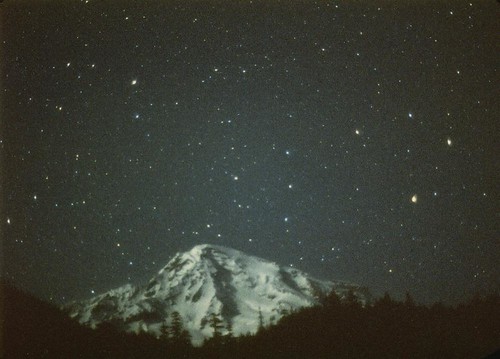(A little music to set the mood, maestro.)
In Love With The Darkness - Xandria
It's the International Year of Astronomy. What better time to turn out the lights?
Those of you who have been hanging about the cantina for some time know that I grew up in Flagstaff, Arizona, which was the first city to protect its night skies from light pollution. They allowed me a childhood under the stars, with the Milky Way a river of light soaring overhead:
I know. You're jealous. Due to light pollution, most of you see night skies more like this:
 The night sky at an suburban park in Voorhees, NJ. This location suffers from significant light pollution. Only the brightest stars can be seen. Single 4 second exposure at ISO 3200 at f/4. Photo courtesy Jerry Lodriguss.
The night sky at an suburban park in Voorhees, NJ. This location suffers from significant light pollution. Only the brightest stars can be seen. Single 4 second exposure at ISO 3200 at f/4. Photo courtesy Jerry Lodriguss.Which is why it's outstanding to see that this year, there's a movement afoot to do something about it:
With Obama coming in to office with a huge initiative to green the country up, now is an excellent time to turn off the lights. I mean, seriously - billions of dollars wasted? It's not just the money, although that's staggering. Think of the greenhouse emissions resulting from that massive waste.Astronomers are fed up. One fifth of the world's population cannot see the Milky Way because street lamps and building lights are too bright. So scientists are mounting a new campaign, called Dark Skies Awareness, aiming to reduce light pollution as part of the 2009 International Year of Astronomy.
"Reducing the number of lights on at night could help conserve energy, protect wildlife and benefit human health," astronomer Malcolm Smith of the Cerro Tololo Inter-American Observatory in Chile wrote in a commentary Wednesday in the journal Nature.
Smith points out that billions of dollars of light is needlessly shined into the sky each year. Beyond the waste of money and energy, this light is blocking people's view of the heavens.
Light pollution harms much more than our night skies and our atmosphere. It harms coral reefs:

But the LPI [Light Pollution Index] is also a direct measurement of coral reef stress, since light itself also affects marine life, according to the study."The lights themselves are a stress in terms of changing the ecology in the environments around them," Longcore explained.
In 2002, Longcore and his colleague Catherine Rich of The Urban Wildlands Group organized a conference for scientists studying light. In 2006, Rich and Longcore co-edited a book on the subject called "Ecological Consequences of Artificial Night Lighting."
[snip]In terms of coral reefs, more research is needed on light's direct effects, but lab studies show that light can disrupt coral reproduction, which is timed to moonlight.
"Light at levels that would seem insignificant to humans can be incredibly significant to marine organisms and even terrestrial organisms," Longcore said.
 In addition to coral reefs, it won't surprise you at all to learn that light pollution harms migratory birds, sea turtles, and many other creatures - as well as us:
In addition to coral reefs, it won't surprise you at all to learn that light pollution harms migratory birds, sea turtles, and many other creatures - as well as us:Light pollution has become almost an integral part of contemporary life. Bright electric light pours on the people who have to work on night shifts, pilots and stewardesses, who often travel from one time zone to another, and inhabitants of the North (where white nights take place in summer). Normal functioning in humans requires regular changing of day and night, light and darkness. In the dark, the epiphysis (the pineal gland) synthesizes the melatonin hormone, but the influence of light at night hours suppresses this synthesis. Melatonin is also a well-known biological blocker of malignant neoplasms. The more intense the night-time light, the stronger it suppresses the melatonin synthesis. Some people are more sensitive to night-time illumination's action than others, for example, women are generally more sensitive than men. Light pollution can cause premature reproductive system ageing, and increase the risk of breast cancer and large intestine cancer in women. Night workers and pilots more often suffer from large intestine or rectal cancers. In addition, irregular light can causes sleep disturbance, gastrointestinal and cardiovascular diseases, metabolic derangements and, possibly increase the likelihood of developing diabetes.You know what? I think I'm going to make an effort this year to do a little more sitting around in the dark. After all, there's this view practically from my back yard when the clouds clear up:
 The southwest side of Mt. Rainier, WA, from near Longmire. Image courtesy StarmanMike.
The southwest side of Mt. Rainier, WA, from near Longmire. Image courtesy StarmanMike.And I'll be passing through this bit of beauty on my journey home this spring:
 A starry night gleams above Owachomo Bridge in Utah's Natural Bridges National Monument—named the first Dark Sky Park by the International Dark-Sky Association (IDA). "Here you see something forgotten," says ranger Scott Ryan, "and reconnect with the sky." Photograph by Jim Richardson, courtesy of National Geographic.
A starry night gleams above Owachomo Bridge in Utah's Natural Bridges National Monument—named the first Dark Sky Park by the International Dark-Sky Association (IDA). "Here you see something forgotten," says ranger Scott Ryan, "and reconnect with the sky." Photograph by Jim Richardson, courtesy of National Geographic.What can you do to get a view light that without having to move? There are a few simple steps you can take to make sure your outdoor lighting does exactly the job it needs to do without mucking up the sky:
Check around your city to see if there's already a dark skies group ready to demand light pollution-free nights, or if your city already has plans to reduce light pollution. And check out these resources for more information:
- Shield the bulb so that light does not shine up into the night sky. This is a major cause of light pollution around our cities and towns.
- Shield the bulb so that light does not shine horizontally. This light will eventually cross property lines and trespass upon a neighbor's property.
- Reduce the wattage of the bulbs you use. Your goal is enough light to move about safely... not read a book or perform surgery.
- Turn your lights on only when necessary. Motion sensors are great for this.. while enhancing the security of your home or business.
Checkout The International Dark Sky Association's Beginners Guide to Lighting Regulation for more info.

The International Dark Sky Association
Utah Skies - Information on Light Pollution
Illinois Coalition for Responsible Outdoor Lighting
The Night - A blog about the night environment
SELENE - Sensible Efficient Lighting to Enhance the Nighttime Environment
Checkout The IDA's Model Lighting Ordinance for ideas on how your community can improve its lighting codes
DarkSky List - Discussion forum and resource library started by International Dark Sky Association members.
Light Pollution News - Articles & Editorials about Light Pollution
Pennsylvania Outdoor Lighting Council (POLC) - providing advice on solving the problems of glare, light trespass and skyglow caused by light pollution
Florida Fish and Wildlife Conservation Commission - Marine Turtle Facts & InfoAdditionally, there are several Yahoo! Groups providing light pollution information and proper lighting techniques. These are attended by many very knowledgeable individuals. Check them out if you need more light pollution information... or have questions that you'd like answered. You'll need to join, but... there is no fee.
Click to join OutdoorLighting-Forum
Click to join Dark Sky List
If we all band together to reduce light pollution, we'll have a cleaner, happier environment, and more of us will have night skies like this:
 A time-exposure photograph of the Milky Way over the New Mexico desert. Image courtesy the New Yorker.
A time-exposure photograph of the Milky Way over the New Mexico desert. Image courtesy the New Yorker.Does anyone need any more reasons to take back the night sky?
I didn't think so. But here's one last reason just in case.
 Gone with the Light By: Babak A. Tafreshi. Image courtesy Dark Skies Awareness.
Gone with the Light By: Babak A. Tafreshi. Image courtesy Dark Skies Awareness.







3 comments:
Now that my neighbors have moved, and the street lights are sometimes turned off, I can almost see the stars from my back yard again. Almost.
There's a wallpaper of that awesome photo of the Milky Way. I've only seen it that clearly a few times in my life, and only once in the Pacific NW. I was camping near Mt. Rainier at the time.
Oh man, the Milky Way is so beautiful... and I've only ever seen it once in my life, when I went camping in the mountains in Pennsylvania. It wasn't even half as awesome as the pictures you've linked, and it was still the most gorgeous thing I've ever seen.
Here's hoping this effort gets through to people, and I can see more than a handful of constellations in my sky in the future.
Here in Portland, a city that styles itself as being green has no outdoor lighting standards. In fact, it is moving the opposite direction. It has gone from 100% cut-off street lighting to "architectural" lanterns (this was done upon the retirement of the head of PDOT's head of of traffic and signals). Meanwhile, on the other side of the Cascades, the city of Bend has a very strict lighting code, absolutely no uplight, none, zero. The shame is that Oregon has some darkest skies I've ever seen (?). So dark the Milky Way casts a shadow and that is dark.
Post a Comment